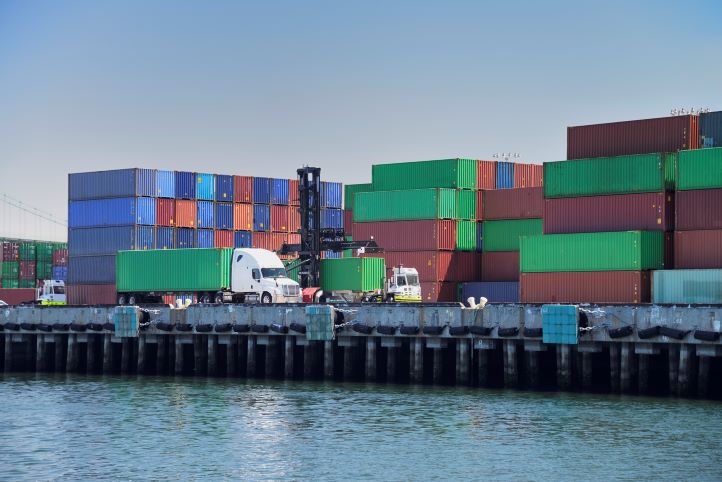WASHINGTON — On the second anniversary of the launch of the Freight Logistics Optimizations Works (FLOW) initiative, the U.S. Department of Transportation (DOT) on Wednesday announced that the FLOW platform has begun to publish data on inland freight hubs, including rail terminal and warehouse end destination data, that will enable FLOW members to have an enhanced view of future container import volumes and traffic.
This data will help inform capacity decisions and avoid supply chain challenges, such as delays, for FLOW participants that will ultimately help lower costs for consumers, according to a news release.
“FLOW is a first-of-its-kind private-public partnership created and led by DOT that creates a more complete, shared picture of the U.S. supply chain for members, which include the nation’s busiest container ports, major ocean carriers, and some of the largest retail importers,” the news release states.
In February 2021, President Biden ordered a whole-of-government approach to tackle supply chain disruptions brought on by the COVID-19 pandemic. The administration’s steady efforts to improve supply chains in the short, medium and long-term have lowered costs for consumers and lowered inflation across the economy.
A recent analysis from the White House Council of Economic Advisors found that supply chains normalizing in some form explain more than 80% of the disinflation the U.S. has experienced since 2022.
“Two years ago, we launched FLOW, the first public-private platform of its kind to share data on supply chains in order to help goods move quickly and cheaply,” said U.S. Transportation Secretary Pete Buttigieg. “The Biden-Harris Administration’s efforts to strengthen American supply chains have helped reduce inflation from pandemic peaks – and today, with the expansion of FLOW, we expect to see even greater benefits to American families and businesses.”
FLOW complements work happening across DOT to invest in supply chains through Biden’s Bipartisan Infrastructure Law (BIL).
Earlier in March, the U.S. Maritime Administration announced that $450 million from BIL is available through the Port Infrastructure Development Program (PIDP), part of the historic $17 billion included in the infrastructure law specifically to strengthen coastal and inland waterway ports.
In January, DOT announced nearly $5 billion in grants to build or repair infrastructure projects that will ease trucking bottlenecks and improve the movement of freight across the country.
“DOT and supply chain stakeholders are applying lessons learned from the pandemic-caused disruptions as it helps manage changes in freight traffic resulting from the reckless Houthi attacks against vessels in the Red Sea, as well as the reduction of traffic in the Panama Canal due to drought conditions,” according to the news release.
Buttigieg has met with mariners, ocean carriers, ports and other industry leaders to discuss the ongoing situation in the Red Sea and its impact on shipping and the freedom of navigation.
The DOT has held regular listening sessions with the freight industry and mariners since the Houthi attacks began last year and have worked with FLOW participants to leverage data on shifting traffic caused by the ensuing disruptions.
Earlier this year, Deputy DOT Secretary Polly Trottenberg traveled to Panama to underscore the importance of building resilient global supply chains and discuss the impact of the drought in the Panama Canal on international commerce.
How FLOW Works
Through the FLOW initiative, DOT collects, aggregates and anonymizes key information shared by participants on inbound containerized freight, starting with importer purchase orders and aligns future demand volumes against current regional capacity to move ocean containers.
FLOW now includes the five largest U.S. container ports, seven of the largest ocean carriers, and nine of the twenty largest retailers by imports, and has over sixty companies in the onboarding process.
Industry members who join FLOW can access secure data through a shared online portal or API hosted by the Bureau of Transportation Statistics.
DOT actively works with industry members to continue to improve and build use cases with FLOW data. Today, FLOW Members are work with USDOT to utilize FLOW data to better estimate port and inland network congestion and monitor cargo shifts due to the Houthi attacks in the Red Sea.
Participants are using FLOW data as an input into existing company processes to better inform supply chain planning.
These efforts work to smooth out supply chain volatility and support commercial needs.
“As one of the original members of the FLOW program, RoadOne’s partnership with the group has been productive and insightful,” said Don Taylor, executive vice president with RoadOne. “The creation of FLOW provides an in depth look throughout the supply chain that portrays the challenges from all of our partners. It has been a pleasure to get acquainted with the USDOT staff and see the immense amount of work they have put into finding solutions for the industry as a whole. I look forward to the continued partnership and see a bright future in how we as a collective can bring solutions to the overall supply chain throughout the country.”
Gene Seroka, executive director with Port of Los Angeles, said that FLOW “provides participants with unprecedented access to supply chain data, empowering our port users with the ability to anticipate potential bouts of congestion.”
He continued: “FLOW has become an invaluable tool to cargo owners seeking to manage their supply chains, and importantly, FLOW has become a safe and trusted repository of supply chain data, opening up possibilities for additional applications to support supply chain resiliency. As one of the nation’s early pioneers in supply chain digitalization, the Port of Los Angeles has been encouraged by the widespread acceptance of supply chain data sharing that Project FLOW has enabled.”
Seroka said that, from his point of view at the port, there are opportunities to leverage FLOW to make the port community system a more powerful tool for port customers.
“Under the leadership of Secretary Buttigieg and the staff at USDOT, FLOW has built a unique public-private partnership that addresses one of the core vulnerabilities of our nation’s supply chains — lack of sufficient data sharing,” he said.
Jennifer McNeill, senior vice president for supply chain operations at TrueValue, said it boils down to making sure everyday Americans have what they need to live.
“We are representing local, independent businesses across America that serve their communities every day,” she said. “Our retailers depend on us for supply chain expertise that enables a consistent movement of goods to their business, and FLOW helps us deliver on that.”
Born in Pine Bluff, Arkansas, and raised in East Texas, John Worthen returned to his home state to attend college in 1998 and decided to make his life in The Natural State. Worthen is a 20-year veteran of the journalism industry and has covered just about every topic there is. He has a passion for writing and telling stories. He has worked as a beat reporter and bureau chief for a statewide newspaper and as managing editor of a regional newspaper in Arkansas. Additionally, Worthen has been a prolific freelance journalist for two decades, and has been published in several travel magazines and on travel websites.











